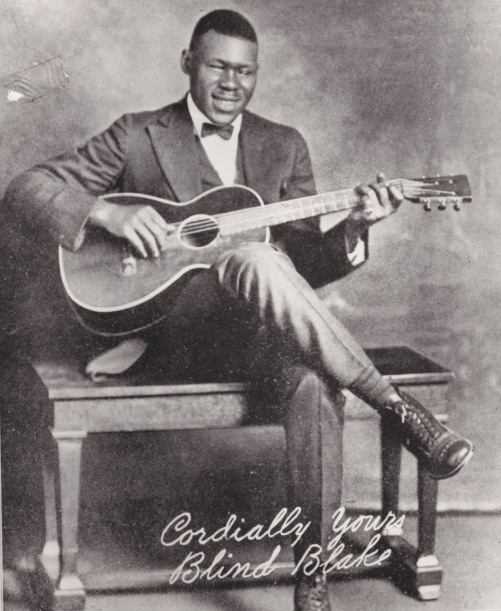<Back to Index>
- Guitarist and Singer Arthur Blake (Blind Blake), 1896
PAGE SPONSOR

Blind Blake (born Arthur Blake; 1896, Newport News, Virginia - December 1, 1934, Milwaukee, Wisconsin) was an American blues and ragtime singer and guitarist.
Blind Blake recorded about 80 tracks for Paramount Records from 1926 to 1932. He was one of the most accomplished guitarists of his genre with a surprisingly diverse range of material. He is best known for his distinct guitar sound that was comparable in sound and style to a ragtime piano.
Little is known about his life. His birthplace was listed as Jacksonville, Florida by Paramount Records in The Paramount Book of the Blues, a publicity publication, but a recently acquired 1934 death certificate from the Milwaukee, WI area lists Newport News as his 1896 birthplace. On one recording he slipped into a Geechee or Gullah dialect, prompting speculation that he was from the Georgia Sea Island region. According to one source, his real name was Arthur Phelps, although concrete evidence for this claim is lacking. The "Phelps" name theory was entirely based on a response given by Blind Willie McTell in an interview conducted in 1955 in Atlanta, who likely met Blake when he passed through McTell's hometown of Statesboro, GA. Recent research has discovered that many of Blind Blake's recordings were copyrighted under the name 'Arthur Blake', and in his two-part recording with Papa Charlie Jackson, "Papa Charlie and Blind Blake Talk About It", the following dialogue is heard:
Jackson: What is your right name?
Blake: My right name is Arthur Blake!
There is only one surviving photograph of him in existence.
Allegedly, Blind Blake was drinking heavily in his final years. It is likely that this led to his early death at only 38 years old. The exact circumstances of his death are not known; Reverend Gary Davis said in an interview that he had heard Blake was killed by a streetcar.
A death certificate for "Arthur Blake" is listed by the Milwaukee County Courthouse (John La Fave, Register of Deeds, 901 N. 9th Street, Milwaukee, Wisconsin). It indicated the cause of death as pulmonary tuberculosis. Arthur Blake's grave is in Glendale, Wisconsin, listed as Evergreen Cemetery (now Glen Oaks Cemetery) in a single grave #72, Range #115. The grave remained unmarked until October of 2012 when one was donated by a company that creates grave markers.
His first recordings were made in 1926 and his records
sold very well. His first solo record was "Early Morning
Blues" with "West Coast Blues" on the B-side. Both are
considered excellent examples of his ragtime based guitar
style and are prototypes for the burgeoning Piedmont
blues. Blake made his last recordings in 1932, the end of
his career aided by Paramount's bankruptcy. Stefan
Grossman and Gayle Dean Wardlow think it's possible that
only one side of Blake's last record is actually by him.
"Champagne Charlie Is My Name" does not actually sound
like Blake's playing or singing. His complex and intricate
finger picking has inspired Reverend Gary Davis, Jorma
Kaukonen, Ry Cooder, John Fahey, Ralph McTell, Leon
Redbone and many others. French singer - songwriter
Francis Cabrel refers to Blind Blake in the song "Cent Ans
de Plus" on the 1999 album Hors-Saison.
On a few records where white jazz guitarist Eddie Lang sat in with African American groups, the record companies listed Lang as "Blind Blake". Most of those recordings, principally with Lonnie Johnson, gave Lang the name "Blind Willy Dunn".
There is also a different artist who recorded multiple LPs under the name "Blind Blake". Alphonso "Blind Blake" Higgs was one of the most popular singers in The Bahamas in the 1950s, leading the house band at the Royal Victoria Hotel. His records were spread all over the U.S. by tourist fans, and several of his songs became folk standards.